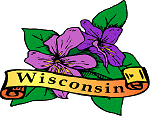

Biographical Sketch of
Francis Gilbert Knight
Transcribed by Sandra Boudrou for the Marquette Co WI Pages
Source: Portrait and Biographical Album of Green Lake, Marquette and Waushara Counties, Wisconsin, published 1890 by Acme Publishing Co., Chicago, Pages 764 - 765 Francis Gilbert Knight, one of the leading citizens of Kingston, Wis., and a loyal defender of his country during the late war, was born in Somerset County, Me., Sept. 19, 1832, his parents, George and Amelia (Rhodes) Knight, being also natives of the Pine Tree State. His mother died when he was about a year old, and he was then reared by an uncle, Gilbert Rhodes, with whom he remained until eighteen years of age, spending his time in the pineries of Maine and Canada. He first came to the West in the month of April, 1857, stopping for a short time at Havanna, Ill., whence in July of the same year, he came to Kingston and engaged in the lumber business for a number of years, until 1862, when he responded to his country's call for troops. The year previous, he had married Harriet J. Knox, a native of New York, and a daughter of Alanson Knox. Bidding good-bye to his young bride, he enrolled his name among the boys in blue and was mustered into service at Oshkosh, as a member of the 32nd Wisconsin Regiment. Shortly afterward the command was ordered to Memphis, Tenn., where it remained a month; then to Hurricane Creek, Miss., whence they started after Price, who was making a raid through some of the Southern States. The regiment participated in the battles of Davis Mills and Holly Springs, after which an engagement was brought on at Grand Junction, Tenn. It went into winter quarters at Bulwer and the following spring was sent to Memphis, Tenn., having charge of the Charleston Depot for six months, during which time the troops also guarded the road for a distance of fifty miles. They then marched on to Vicksburg under Gen. Sherman, and thence east to Meriden, and after some slight skirmishes returned to Cairo, whence after a short time they were sent out to gain knowledge of the whereabouts of Forrest. Boarding some steamers on the Tennessee River, they then proceeded by water as far as the boats could go, and on landing marched across the country to Decatur, Ala., where the brigade to which Mr. Knight belonged built a fort and was stationed three months, participating in several skirmishes during that time. The next important engagement in which he took part was the siege and capture of Atlanta, which was followed by the celebrated March to the Sea under Sherman. On their March to the Sea, they participated in the battles of Three Rivers, Bentonville, and a number of others. He also participated in the Grand review at Washington, after which he received his discharge, and on his return to Milwaukee was mustered out of service. Mr. Knight was ever faithful to his duty as a soldier, and though he was in some of the most hotly contested battles of the war, was never known to flinch or falter. To such men the preservation of the Union is due and too much cannot be said in praise of their heroism and noble self-sacrifice in leaving their homes and families, perhaps never again to return. Immediately after being mustered out, Mr. Knight returned to his home, and the joy of that hour can better be imagined than described. Six children have been born of his union with Miss Knox: Amelia, Catherine, Gilbert A., Allen, Henry and Arthur, who died at the age of fourteen years. In political sentiment, Mr. Knight is a Republican, and socially is a member of the G. A. R. Post of Kingston. Both he and his wife are members of the Methodist Episcopal Church, also their children, and in the Master's vineyard, they are earnest workers. They have a pleasant home in Kingston, and are held in high regard by all who know them. Mr. Knight is one of the leading citizens of Green Lake County, and probably no man in the community has more friends than he.
Back to the Marquette Pages Menu